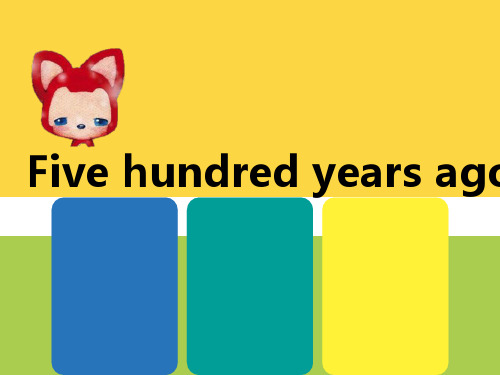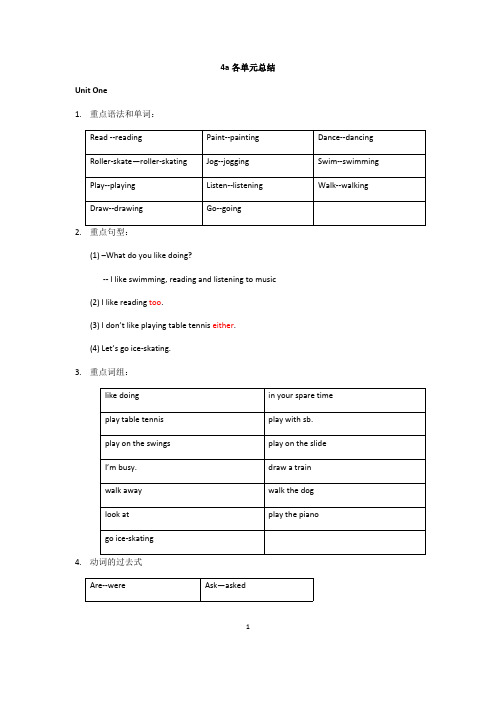香港朗文版4A-Chapter4-Five-hundred-years-ago
- 格式:ppt
- 大小:8.70 MB
- 文档页数:36


4a各单元总结Unit One1.重点语法和单词:Read --reading Paint--painting Dance--dancing Roller-skate—roller-skating Jog--jogging Swim--swimming Play--playing Listen--listening Walk--walking Draw--drawing Go--going2.重点句型:(1) –What do you like doing?-- I like swimming, reading and listening to music(2) I like reading too.(3) I don’t like playing table tennis either.(4) Let’s go ice-skating.3.重点词组:like doing in your spare timeplay table tennis play with sb.play on the swings play on the slideI’m busy.draw a trainwalk away walk the doglook at play the pianogo ice-skating4.动词的过去式Are--were Ask—asked1Say—said Reply—repliedGet—got Walk--walkedLeave--leftGo—wentThink--thoughtUnit two1.重点语法和单词:Always Usually OftenSometimes Never2.重点句型:(1)--Do you ever tidy your room?-- Yes, I usually tidy my room.(2)—Does she ever play the violin?-- No, she never plays the violin.-- No, she doesn’t play the violin.3.重点词组:look after your pets go to bed earlytidy your room eat outget up late surf the Netget angry talk to sb.take photos invite sb. to one’s home am/is/are good at something show one around2look around go into the dining roomenjoy the meal play a lot of musicplay the recorder play the pianoplay the violin play a lot of sportplay pingpong play table tennisplay football watch football matches4.动词的过去式say—said talk—talkedcan—could ask--askedthink—thought show--showedhave—had call—calledwill--would enjoy--enjoyedspill—spilled/spilttake--tookgo--wentUnit Three1.重点语法:am/is/are--was are--were ask--asked like--likedfly--flew make--made flick--flicked want--wanted catch--caught draw—drew stay--stayed happen--happened put--put say--said Play--playedhave/has--had hit--hit3keep--kept go--wentlose--lost do--didwin--won2.重点单词和词组:cola fast food CDscomics clocks air-consmobile-phones rickshaw an oil lampclogs camera fanstove play computer games fly kitesplay hopscotch make nets catch butterflies play marbles draw a circle on the groundgo out of the circle want to +动词原形flick the shooter into thecirclego out a lot of credit cardswear trainers have telephones check your answer ask someone3.重点句型:(1)--Was there any cola when you were young?-Yes, there was.(2) The game I like best was marbles.(3) How do you play marbles?(4)– Did you wear trainers fifty years ago?--Yes, I did.(5)—Did you have a telephone?4-- No, I didn’t. Rich people had telephones at home but poor people didn’t. (6 ) – Did you shop at the supermarket?--- No, I didn’t. There weren’t any supermarkets.(7) – Did you go to school?-- No, I didn’t. Rich children go to school but poor children didn’t.(8) –Did you listen to the radio?-- Yes, I did.Where(哪里)do you like going to in your holiday?How(如何)do you help at home?How much (多少钱,提问不可数名词)is it? --- It is five dollars. How many (多少,提问可数名词)books in your home?What time(什么时间)is it?What(什么)are you doing now? ----I am doing my homework. What(什么)is the weather like today? ----It’s windy.What color (什么颜色)is it? ---- It is red.What (什么)are you? ( What do you do?) -----I am a driver.When(什么时候)is your birthday? ---on 2nd MayHow old(多大)are you? ----I am ten.Who (谁) are you? -----I am David.Which(哪一个) club do you want to join?5Why(为什么)do you like playing football?----Because I like being healthy.6。


《朗文英语4A》复习提要Chapter 4:Five hundred years ago五百年之前I. 经过第4章的学习,下面的新单词我们要准确无误地读(read them correctly),知道它们的中文意思(know the Chinese meaning),不看书进行英汉互译( translate),并且还要会拼写( spell)。
cotton clothes棉质衣服silk clothes丝绸衣服a horse一匹马a sedan chair一台轿子silver and gold银子和金子paper money纸币a village 一个村子a town一个镇子II.句型。
下面的关键句型我们要会读(read), 知道意思(know the Chinese meaning),会根据不同的语境来运用(use them in different contexts),会写(write them correctly)。
1. --What did people wear 500 years ago?-- Most people wore cotton clothes.Some people wore silk clothes--五百年前人们穿什么?--大部分人穿棉质衣服。
一些人穿丝绸衣服。
2. -- How did people travel 500 years ago?--Most people walked or rode horses.Rich people travelled by sedan chairSome people travelled by boat.-- 五百年前人们怎么旅行?--大部分人步行或骑马去旅行。
富人坐轿子旅行。
一些人坐船旅行。
3.-- How did people pay for things 500 years ago? Or we can say:How did people pay 500 years ago?--Most people paid for things with silver and gold.Or we can say: Most people paid with silver and gold. --Some people paid for things with paper money.Or we can say: Some people paid with paper money. --五百年前人们怎么买东西?--大部分人用银子和金子买东西。

4A Chapter1 背诵内容一.单词部分n.名词v.动词vt. 及物动词vi.不及动词pron. 代词prep. 介词adj. 形容词adv. 副词conj. 连词num. 数词art. 冠词interj.感叹词Part I.1.activity [ækˈtɪvətɪ] n. 活动2.spare [speə] adj. 空余的,空闲的3.roller-skate ['rəʊləˌskeɪt] vi./n. 滚轴溜冰; 滚轴溜冰鞋4.jog [dʒɒg] vi. 慢跑5.too [tu:] adv. 太;也6.either [ˈaɪðə] adv./pron. 也(否定句);(两者中)任何一个7.reply [rɪˈplaɪ] vt./vi. 回答Part II. Past form(过去式)walk—walked ask—asked reply—replied say—said draw-drew be—was/were think—thought go—went get—gotPart III. Gerund (动名词)swim—swimming jog—jogging roller-skate—roller-skating dance—dancing paint—painting listen—listening二.词组部分1.in one’s spare time在某人的空余时间2.listen to (the) music 听音乐3.play chess 下棋4.like/love/enjoy doing 喜欢干某事5.go swimming (去)游泳6.go jogging (去)慢跑7.go roller-skating (去)溜冰8.make a new friend named Tom 交了一个叫汤姆的朋友9.in fact=as a matter of fact= actually 事实上10.i n the gym 在体育馆11.i n the fitness club 在健身俱乐部12.i ndoor stadium 室内体育馆13.d ance flamingo 跳弗莱明哥14.p erform ballet 跳芭蕾15.f inish doing 完成某事/干某事16.p ractise sth./doing 练习某事/干某事17.b e good at sth./doing 擅长于某事/干某事18.b e poor at sth./doing 不擅长于某事/干某事19.b e interested in sth./doing 对干某事/干某事感兴趣20.b e afraid of sth./doing 害怕某事/干某事21.a detective story called Conan 一个叫作《科南》的侦探故事22.o ne of the most famous artists 著名的画家之一(一位著名的画家)23.a t the weekend/at weekends/on the weekend 在周末24.a middle-aged woman 一位中年妇女25.o n weekdays 在工作日,平日26.b e busy with sth. 忙于某事27.b e busy doing 忙于干某事28.b e important to sb. 对某人而言是重要的29.e njoy the fresh air and the beautiful moments 享受新鲜的空气与美妙的时光30.e njoy oneself= have a good time 某人玩得很开心31.a family helper 一位家庭帮手32.s end and pick up kids 接送小孩33.p lay the piano/violin 弹钢琴,拉小提琴(西洋乐器名词前加the )34.p lay Erhu 拉二胡(民族乐器前无the)35.p lay table tennis 打羽毛球(球类名词前无the)36.p lay on the swings/slide 在秋千(滑滑梯)上玩37.p lay with sb. 与某人一起玩38.p lay with sth. 玩耍某物39.a bit later 一会儿以后40.w alk away sadly 难过地走开了41.w alk the dog 溜狗42.w alk home=go home on foot 走回家43.g o home =go back home 回家44.g et home=arrive home 到家45.a fter that 在那以后46.t he black notes (钢琴上)黑键47.s ee sb. doing 看到某人在干某事(强调片断)三.句子部分Part I.1.What do you like doing? 你喜欢干什么?2.I like doing…,too/as well. 我也喜欢做某事。

《朗文英语4A》复习提要Chapter 5: Animals big and small大大小小的动物I. 经过第5章的学习,下面的新单词我们要准确无误地读(read them correctly),知道它们的中文意思(know the Chinese meaning),不看书进行英汉互译(translate),并且还要会拼写(spell)。
a horse 一匹马 a camel 一匹骆驼a giraffe 一头长颈鹿an owl 一只猫头鹰a peacock 一只孔雀an eagle 一只老鹰a panda 一只熊猫 a hippo 一只河马(hippos 复数)an elephant 一头大象 a rabbit 一只兔子a rat 一只老鼠(大) a mouse 一只老鼠(小) (mice 复数)*注意mouse 和rat的区别:在英语中,rat含有贬义,就像国内的过街老鼠,肮脏,是害虫。
Mouse一般不含贬义,外国人看mouse是一种动物,一般指实验室里的小白鼠。
还有一种老鼠是仓鼠(hamster)。
II.句型。
下面的关键句型我们要会读(read), 知道意(know the Chinese meaning), 会根据不同的语境来运用(use them in different contexts),会写(write them correctly)。
1. The horse, the camel and the giraffe are tall.The camel is taller than the horse.The giraffe is the tallest.2. The owl, the peacock and the eagle are big.The peacock is bigger than the owl.The eagle is the biggest.3. The panda, the hippo and the elephant are heavy.The hippo is heavier than the panda.The elephant is the heaviest.4. The rabbit, the rat and the mouse are small.The rat is smaller than the rabbit.The mouse is the smallest.总结: (1). 比较级结构:A+ be+ adj.er + than+ B. : A比B……be动词由时态和主语A决定。
最新香港朗文4A各单元知识要点词汇语法以下是最新版香港朗文4A各单元的词汇和语法要点:Unit 1: Going Places- 词汇:transportation(交通工具),destination(目的地),navigate(导航),explore(探索)- 语法:一般现在时,there is / there are句型,情态动词can的用法Unit 2: Nature's Forces- 词汇:natural disasters(自然灾害),flood(洪水),earthquake(地震),hurricane(飓风),volcano(火山)- 语法:一般过去时,情态动词must / mustn't的用法Unit 3: Materials and Properties- 词汇:materials(材料),properties(特性),solid(固体),liquid(液体),gas(气体)- 语法:现在进行时,情态动词should / shouldn't的用法Unit 4: Diverse Cultures- 词汇:diverse(多样化的),culture(文化),tradition(传统),custom(风俗),celebration(庆祝活动)- 语法:现在完成时,情态动词could / couldn't的用法Unit 5: The Arts- 词汇:artistic(艺术的),creative(创造性的),performance(表演),sculpture(雕塑),painting(绘画)-语法:一般将来时- 语法:过去进行时,情态动词may / must的用法以上是最新香港朗文4A各单元的词汇和语法要点。
请注意,这些要点可能会因版本差异而有所变化,建议参考最新教材或教师的指导。
4A Chapter 4 背诵内容I. 音标和单词:1.hundred ['hʌndrəd] num. 一百thousand ['θaʊznd] num. 一千2.cotton ['kɒtn] n. 棉;棉布;棉织物3.silk [sɪlk] n. 丝绸;(蚕)丝;丝织物;(用于缝纫的)丝线4.horse [hɔːs] n. 马5.sedan chair [sɪ'dæn tʃeə] n. 轿子6.silver ['sɪlvə] n. 银;银色;白银,银子7.coin[kɔɪn] n. 硬币; 金属货币;8.gold [ɡəʊld]n. 金,金色,金黄色;黄金9.paper money ['peɪpə 'mʌnɪ] n. 纸币;票子;钱票10.village ['vɪlɪdʒ] n. 村庄;乡村11.town [t aʊn] n. 小镇;城镇12.content(s) ['kɒntent] n. 目录13.tunnel ['tʌnl] n. 地下通道;地道;隧道14.bridge [brɪdʒ] n. 桥;桥梁15.airport ['eəpɔːt] n. 机场16.fridge [frɪdʒ] n. 冰箱17.pigeon ['pɪdʒɪn] n. 鸽子附:Chapter 4动词过去式变化表(详见朗文P62-65总表)do-did go-went wear-wore find-foundtravel-travelled/traveled pay-paid live-livedam/is-was are-were feel-felt try-tried fall-fellwake-woke keep-kept start-startedstop-stopped look-looked say-said take-tookask-asked write-wrote can-could have-had explain-explained miss-missed give-gave want-wanted cook-cooked eat-ate drink-drank buy-bought celebrate-celebrated make-made listen-listenedII. 词组:1.five hundred years ago 五百年前ten thousand years ago 一万年前2.do a history project 做一个历史课题do a history project on life 500 years ago 做一个关于500年生活的的历史课题3.cotton clothes 棉布衣服4.silk clothes 丝绸服装5.find out 查出,发现6.ride a horse/ride horse s骑马7.travel by sedan chair 乘轿子出行8.travel by boat 乘船出行9.most people 大多数人common people 普通人,平民some people 一些人rich people 富人,有钱人10.in villages 在村庄in towns 在城镇11.pay for things 付款(购物)12.contents page 目录页13.free time 空闲时间14.make money 赚钱15.work hard 努力工作;努力学习16.cook with gas 用煤气做饭cook with firewood 用柴火做饭17.eat congee and vegetables 吃粥和蔬菜eat rice and meat 吃米饭和肉18.live in flats 住在公寓里live in simple/large houses 住在简易的房子/大房子里19.celebrate Christmas 过圣诞节celebrate Chinese New Year 过春节20.buy food at supermarkets 在超市买食品buy food at markets 在集市买食品21.life in the past 过去的生活22.dream about … 梦见……23.do one’s homework 做作业24.feel sleepy 感到困倦,发困,昏昏欲睡25.try to do sth. 尽力做某事try one’s best = do one’s best 竭尽全力26.after a while 过了一会儿27.wake up 醒来28.fall asleep 睡着asleep adj. 睡着的(反义词:awake adj. 醒着的)29.keep in touch with sb. 与某人保持联系30.be away from home 离家在外31.start to do sth. 开始做某事32.look out 往外望Look out! 当心!小心!33.ride in a sedan chair 坐轿子34.miss his own family 想家35.send letters 寄信36.by land 陆运by sea 海运by air 空运37.at the door 在门口III. 句型:1.How did they keep in touch with their families when they were awayfrom home? 离家在外的人们是怎么与他们的家人保持联系的?2.Please may I use your phone? 我能借用一下你的电话吗?I want to call my father. 我想要打电话给我爸爸。